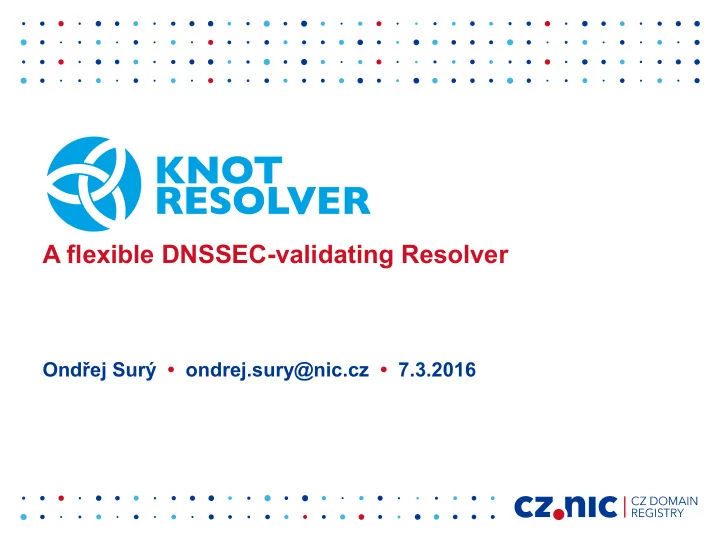

A flexible DNSSEC-validating Resolver Ondřej Surý • ondrej.sury@nic.cz • 7.3.2016
What is Knot DNS Resolver? ● Platform for building recursive DNS service ● Open-source DNS Resolver (GPLv3+) ● Full DNSSEC support: ● RFC 6650 – ECDSA support ● RFC 5011 – Automated Trust Anchor Management ● RFC 7646 – Negative Trust Anchors
What is Knot DNS Resolver? ● Written in C and LuaJIT ● Scriptable daemon with dynamic configuration in Lua ● Simple core extensible with modules in C, Lua & Go ● “Happy Eyeballs” IPv6 (20ms headstart) ● No internal threading, scales by self-replication
Who is it for? Everybody! ● Large recursive DNS farms ● Small recursors in private networks ● Personal resolvers ● Geeks, tinkerers, you :)
Large recursive DNS farms ● Scales, the really fast scriptable engine allows you to change resolution ● Flexible shared cache backends ● Local: lmdb ● Networked: memcached, redis ● New instances just pick the data from the shared cache ● Great statistics, metrics, and plotting with Graphite backend ● and f.e. InfluxDB, Grafana ● RF7646 Negative Trust Anchors ● Cluster-aware – etcd module for shared self-configuration ● Views and ACL support ● Prefetching
Plotting in Grafana
Small recursors in private networks ● QNAME minimisation for DNS privacy ● DNSSEC and RFC5011 key management ● Low memory consumption (cache can be paged out) ● Query policy based resolution ● Match: pattern, suffix, RPZ ● Action: PASS, DENY, DROP, FORWARD, TC ● DNS64 support to complement NAT64
Personal resolvers ● Simple config-less operation ● Just give it a writeable file for DNSSEC root trust anchor and you are good to go ● Persistent caching (survives reloads/reboots) ● Tinyweb module for monitoring your queries ● Live Demo: https://kitsune.labs.nic.cz/ ● Future: ● DNS over HTTP and dealing with “hotel wifis” ● DNS over TLS (as the standards mature)
Tinyweb output
Geek, Tinkers, … ● kresd is scriptable without binding go port 53 ● scripts/kresd-host.lua ● dig/host like utility $ ./scripts/kresd-host.lua -c IN -t AAAA www.fosdem.org www.fosdem.org has IPv6 address 2001:67c:1808::5 ● scripts/kresd-query.lua ● Prints DNS response QNAME kresd-query.lua -t SOA cz "print(pkt:qname())" cz ● Prints RCODE from the DNS response kresd-query.lua -t SOA nan. "print(pkt:rcode())" ← 3 # NXDOMAIN ● API specification in the documentation
Current status ● A beta phase of the project and almost a release candidate ● Ongoing thorough testing ● Comes with extensive documentation ● http://knot-resolver.rtfd.org ● Give it a try! ● Shiny new website: https://www.knot-resolver.cz/ ● Debian and Ubuntu packages (see the website) ● Sources: https://gitlab.labs.nic.cz/knot/resolver ● Docker # docker run cznic/knot-resolver ● Throw a normal and a weird DNS stuff on it ● Report back any oddities or success stories
Thank you and you can Knot! https://www.youtube.com/watch?v=aMxcAaR0oHU
Recommend
More recommend